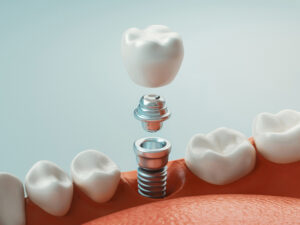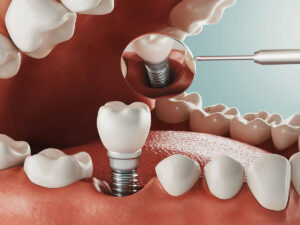Dental Implants
Dental implants appear and function like natural teeth while providing a permanent and dependable solution for tooth replacement, whether one or multiple teeth are missing.
Dental Implants in Barrhaven, ON
Dental implants are a type of titanium alloy posts that are surgically placed into the jawbone to replace missing teeth or to support full all-on-4 implants. These posts act as artificial roots for the crown, and they can stabilize bone levels and prevent bone loss, which results in better long-term support, function, and aesthetics.
Compared to other restoration methods like dental bridges, dental implants require less adjustment or shaving of surrounding teeth. They are also more flexible and provide a more natural feeling than dental bridges and partial or full dentures. They are a great option if you’re looking for dental implants in Barrhaven, ON.
Book Online Call Barrhaven Dental Studio

How Much Do Dental Implants Cost?
At Barrhaven Dental Studio, we provide affordable and high-quality dental care to our patients so they can receive the treatment they need without worrying about cost. The cost of dental implants can differ depending on various factors, such as the materials used, insurance coverage, and the requirement for bone grafts. After your initial consultation, our office is always happy to provide you with an estimate of the procedure’s cost. We understand that cost, payment plan options, and insurance coverage are major concerns for many patients who consider dental implants. Our staff is always ready to help and address these concerns so that you can receive the care you require. We believe in discussing all possibilities with our patients to avoid any surprises.

Dental Implant Process at Barrhaven Dental Studio
- Consultation & Examination: To determine if dental implants are the proper restoration method for you, we will conduct a thorough examination, which includes a 3D scan for placement planning, discussing your surgical guide for placement, and providing an overview of your overall treatment options.
- Tooth Extraction & Bone Grafting: The procedure will be scheduled after establishing a treatment plan if a tooth extraction is necessary. This will require a recovery period to ensure the site is ready for the implant procedure. Any bone grafting needed to support the implant will be carried out, which takes several months to heal.
- Implant Placement: After the site is ready, the implant will be placed into the jawbone, followed by a healing cap. Regular check-ups will be scheduled to ensure proper healing.
- Implant Healing: After the dental implant is placed, osseointegration begins, and the jawbone heals around the implant, providing a stable base for the artificial tooth. This process typically takes around three months.
- Abutment and Crown Placement: Once healing is complete, the abutment, connecting piece, and a replacement tooth, or crown, can be placed.
Common Questions
-
What does dental implant aftercare look like?
After dental implant placement, it's essential to avoid disturbing the placement site. This means you should avoid chewing near the implant and carefully clean the area for several weeks to a month after placement. The implant needs several months to fuse to the jaw, so minimizing disturbances during that period is essential. If you have a temporary denture, it must not rub on the surgical site.
After implantation and extraction or grafting, you may experience discomforts associated with any oral surgery, such as swelling, pain at the site, and minor bleeding. Here are some specific recommendations for the first two weeks after any procedure during the process to ensure proper healing and recovery:
- Pain Management. Ibuprofen is highly recommended after surgery as it reduces pain and swelling.
- Oral Hygiene. Gentle brushing is crucial to maintain the recovery area's cleanliness and avoid irritation from aggressive brushing. Warm salt water rinses can also aid in keeping the area clean and reducing pain and swelling.
- Minor Bleeding. It's common to have a small amount of blood in your saliva for a day or two after oral surgery. You can gently bite on a gauze pad for 30 minutes to help with this. If bleeding continues over a few days, contact your dentist's office.
- Swelling. In addition to ibuprofen and saltwater rinses, periodically placing an ice pack on your cheek near the affected area can help.
-
How long do dental implants last?
Dental implants are designed to last a lifetime. The post will fuse with your jawbone, and in most cases, it will never require replacement or further intervention. However, the dental crown or the artificial tooth attached to the implant may have a lifespan of around 10 to 30 years. Caring for the dental crown the way you do for your natural teeth is essential. Brushing twice a day, flossing, and regular dental checkups will help increase the lifespan of your crown.
Dental implants are an incredibly safe and effective type of restorative dentistry. However, there is a small chance that the implant may fail to integrate with the jawbone after implantation, leading to its removal. Certain medical conditions can increase the risk of implant failure. Like any surgery, placing a dental implant poses a potential surgical complication risk.
-
Are dental implants painful?
The most painful part of the dental implant process is extracting any teeth that implanted crowns will replace. However, any extraction will include anesthesia, meaning little to no pain during the procedure and only a few days of recovery. Any pain experienced during recovery should also be manageable using over-the-counter medications such as ibuprofen.
-
How do I know if I need a bone graft?
You may need a bone graft if you are considering getting a dental implant but do not have enough bone to support it. Determining whether a dental bone graft is necessary can only be done by consulting your dental implant specialist. However, you are more likely to need a bone graft if you have lost one or more teeth and have not replaced them for a while. Over time, missing teeth can result in gradual bone loss. Additionally, if you have observed any changes in the shape of your jaw over time, that can also indicate oral bone loss.
Ready To Schedule Your Consultation?
Are you ready to enjoy your favorite foods and no longer be in pain? Call our office or you can book your consultation online today!
